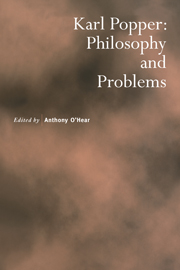Book contents
- Frontmatter
- Contents
- Introduction
- Popper, Science and Rationality
- Popper and Reliabilism
- The Problem of the Empirical Basis
- ‘Revolution in Permanence’: Popper on Theory-Change in Science
- Popper's Contribution to the Philosophy of Probability
- Propensities and Indeterminism
- Popper on Determinism
- Popper and the Quantum Theory
- The Uses of Karl Popper
- Popper and Darwinism
- Popper and the Scepticism of Evolutionary Epistemology, or, What Were Human Beings Made For?
- Does Popper Explain Historical Explanation?
- The Grounds for Anti-Historicism
- What Use is Popper to a Politician?
- Ethical Foundations of Popper's Philosophy
- Works of Karl Popper Referred to in the Text
- Notes on Contributors
- Index
What Use is Popper to a Politician?
Published online by Cambridge University Press: 19 January 2010
- Frontmatter
- Contents
- Introduction
- Popper, Science and Rationality
- Popper and Reliabilism
- The Problem of the Empirical Basis
- ‘Revolution in Permanence’: Popper on Theory-Change in Science
- Popper's Contribution to the Philosophy of Probability
- Propensities and Indeterminism
- Popper on Determinism
- Popper and the Quantum Theory
- The Uses of Karl Popper
- Popper and Darwinism
- Popper and the Scepticism of Evolutionary Epistemology, or, What Were Human Beings Made For?
- Does Popper Explain Historical Explanation?
- The Grounds for Anti-Historicism
- What Use is Popper to a Politician?
- Ethical Foundations of Popper's Philosophy
- Works of Karl Popper Referred to in the Text
- Notes on Contributors
- Index
Summary
Some years acquire symbolic status, and one such year is 1968. All over Europe and the United States university students exploded into violent rebellion. Insofar as this would-be revolution had an ideology it was unquestionably Marx-inspired, even if the Marxism was not always orthodox. It so happens that in the years 1970–1971 I was teaching philosophy at Balliol College, Oxford. And because of Oxford University's system, almost unique, of individual tuition for undergraduates, this meant I found myself in a continuing one-to-one relationship with bright students who were in the throes of revolutionary fervour.
Arguing with them was enormously illuminating for me. It seemed as if the more intelligent they were the more passionately Marxist they were–but also the more affected they were by intellectually serious criticisms of Marxism, which usually they were hearing for the first time. It was when they found themselves unable to meet these that they revealed where their fundamental motivation lay. This was not usually a positive one of belief in Marxist ideas. Still less was it commitment to communist forms of society, which usually they had been defending without knowing anything about the reality of them. The motivation was usually negative: it was inability or refusal to come to terms with their own society as they saw it. Psychologically, this was nearly always at the root of their attitude.
Basically the chain of cause and effect between their ideas seemed to go something like this.
- Type
- Chapter
- Information
- Karl PopperPhilosophy and Problems, pp. 259 - 274Publisher: Cambridge University PressPrint publication year: 1996
- 1
- Cited by



